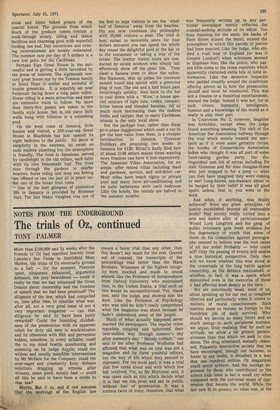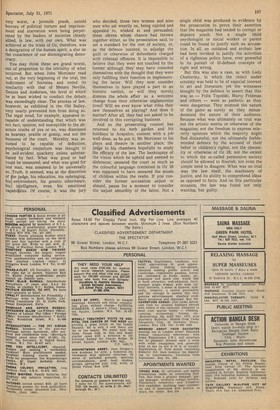NOTES FROM THE UNDERGROUND
The trials of Oz, continued
TONY PALMER
More than E100,000 and 51 weeks after the Friends of Oz had marched bravely from Lincoln's Inn Fields to Smithfield Meat Market, the trials of Oz eventually ground to a halt — for the moment. Passions ;pent, eloquence exhausted, arguments defeated, the jury bewildered — could it really be that we had witnessed the Great Debate about censorship and the freedom of speech that we had been promised? The diligence of the law, which had compelled us, time after time, to consider what was, after all, not a very good issue of not a very important magazine — can that diligence be said to have been justly rewarded? Could the bumbling childishness of the prosecution with its apparent relish for dirty old men in mackintoshes and its obsession with filth and perversion hidden, somehow, in every syllable; could the to my mind hostile questioning and summing up by Judge Argyle; could the witless and mostly inaudible interventions by Mr McHale for the Company; could the over-eager and constantly busy defence solicitors dragging up witness after witness, some good, mostly bad — could all this be said to have been a credit to that law?
Maybe. But if so, and If one assumes that the Workings of the English law ensure a fairer trial than any other, then this doesn't say much for the rest. Quoted out of context, the transcripts of the proceedings read better than the Marx Brothers. Witnesses of the highest integrity were mocked and made to sound absurd; like the Professor of Jurisprudence from Oxford University who maintained that, in the United States, a trial such as this would be unconstitutional. Yes, thank you, said the judge, and showed him the door. Like the Professor of Psychology who was told he didn't really comprehend what the magazine was about because he hadn't understood some of the jargon.
Much of what actually happened never reached the newspapers. The regular crime reporters coughed and spluttered their beer-sodden way through summer's day after summer's day. "Bloody rubbish," one said to me after Professor Wollheim had affirmed that what was on trial was not a magazine and its three youthful editors, but the way of life which they seemed to represent. For the most part, it was a trial that few cared about and with which few felt involved. Yet, as Mr Mortimer said, it was cases such as this which decide what it is that we can print and say in public, without fear of prosecution. It was a curious twist of irony, therefore, that what
was frequently written up in any particular newspaper merely reflected the scandal-seeking attitude of its editor. Too busy listening for the smut, the hacks of Fleet Street missed the detail, missed the atmosphere in which this parody of justice had been enacted. Like the judge, who studied a road map of England (or was it Greater London?) when witnesses seemed to displease him; like the police, who passed little notes to the crime reporters which apparently contained extra bits of lurid information. Like the detective inspector who padded steadily around the courtroom offering advice as to how the prosecution should and must be conducted. This was not a theatre or a theatrical entertainment, warned the judge. Indeed it was not, for at such events, humanity, intelligence, humour and a knowledge of the world as it really is play their part.
In Courtroom No. 2, however, laughter was forbidden, except when the judge found something amusing. The visit of the American Bar Association halfway through the trial which noisily treated the spectacle as if it were some geriatric circus; the hordes of Conservative Association ladies who thought it was all part of some fund-raising garden party, the distinguished cast list of extras including Sir Alec Guinness and Sir Alec Douglas-Home who just stopped in for a peep — what can they have imagined they were coming to see? Long-haired, sex-maniacs about to be hanged by their balls? It was all good sport; unless, that is, you were in the dock.
And what, if anything, was finally achieved? Were any great principles of justice established beyond all reasonable doubt? Had society really turned into a new and darker alley of permissiveness? Would Lord Longford and his gang of public reformers gain fresh evidence for the degeneracy of youth that some of those on his committee against pornography seemed to believe was the root cause of all our evils? Probably — who could tell? Only the passing of events will enable a true historical perspective. Only then will we know whether this trial stood at the crossroads of the long battle against censorship, as the defence maintained, or whether, in fact, it was a speck which diminished even in the memories of those it had affected most deeply at the time.
We are notoriously weak, most of us, about speaking up for our real or imagined liberties and particularly when it comes to matters of moral consciousness. Such matters seem so remote, so foreign to the humdrum job of daily survival. Why should we devote so many hours and so much energy to such peripheral matters, we argue, little realising that by such an attitude, we allow a far greater permissiveness than that which we seek to condemn. The drug orientated, sexually obsessed, flippantly destructive society that we have encouraged, though our laziness, to fester in our midst, is decadent in a way that one hundred million Oz magazines could never achieve. And the outrage expressed by those who contributed to the school kids issue is but a small cry when compared with the universal moan of oppression that haunts the world. While the law saw fit to pounce on what was, at the very worst, a juvenile prank, untold horrors of political torture and imprisonment and starvation were being perpetrated by the leaders of societies closely allied, in law, with our own. What was achieved at the trials of Oz, therefore, was a denigration of the human spirit, a slur on the conscience of our disintegrating democracy.
You may think these are grand words, out of proportion to the triviality of what occurred. But when John Mortimer read out, at the very beginning of the trial, the indictment of Socrates and noted its similarity with that of Messrs Neville, Dennis and Anderson, the level at which he at least wished to conduct the debate was exceedingly clear. The process of law, however, as exhibited in the Old Bailey, very nearly prevented him from doing so. The legal mind, for example, appeared incapable of understanding that which was not fact; opinion, not susceptible to the absolute truths of yes or no, was dismissed as hearsay, prattle or gossip, and not the business of the court. Morality was assumed to be capable of definition; psychological conjecture was thought to be self-evident quackery unless substantiated by fact. What was good or bad could be measured; and what was good for one man, was assumed to be universally so. Truth, it seemed, was at the discretion of the judge, his education, his upbringing, his enVironment, his genetic inheritance, his, iriltelligence, even his emotional capabitifies. Of course, it was the jury
who decided, those two women and nine men who sat wearily on, being cajoled and appealed to, winked at and persuaded; these eleven whom chance had thrown together either, as the prosecution said, to set a standard for the rest of society, or, as the defence insisted, to adjudge the guilt or otherwise of defendants charged with criminal offences. It is impossible to believe that they were not touched by the former although they' may have consoled themselves with the thought that they were only fulfilling their function in implementing the latter. Will they now consider themselves to have played a part in an historic verdict, or will they merely dismiss the whole affair as a welcome change from their otherwise unglamorous lives? Will we ever know what roles they saw themselves as playing? And does it matter? After all, they had not asked to be involved in this corrupting business.
And so the prosecuting counsel has returned to his herb garden and his holidays in Acapulco, content with a job well done, as he put it; Mr Mortimer to his plays and theatre in another place; the judge to his chambers hopefully to study the efficacy of the law. The bankruptcy of the vision which he upheld and seemed to dishonour, smeared the court as much as the colourful language contained in Oz 28 was supposed to have smeared the minds of children within the realm. If you consider the former accusation unjust or absurd, pause for a moment to consider the unjust absurdity of the latter. Not a single child was produced in evidence by the prosecution to prove their assertion that the magazine had tended to corrupt or deprave youth. Not a single child psychologist or social worker or parent could be found to justify such an accusation. In all, an outdated and archaic law had been invoked to justify the activities of a righteous police force, ever powerful In its pursuit of ill-defined concepts of right and wrong.
But this was also a case, as with Lady Chatterley, in which the object under scrutiny was held to be of especial interest to art and literature; yet the witnesses brought by the defence to assert that this was so — Felix Topolski, Marty Feldman and others — were as pathetic as they were dangerous. They mistook the nature of the game as surely as they misunderstood the nature of their audience. Because what was ultimately on trial was not the artistic merits or otherwise of the magazine; not the freedom to express minority opinions which the majority might find distasteful; not the ultimately feebleminded defence by the accused of their belief in children's rights; not the obscenity or otherwise of Oz 28; not the extent to which the so-called permissive society should be allowed to flourish; not even the simple need to disagree. What was on trial was the law itself, the machinery of justice, and its ability to comprehend ideas as opposed to facts. And on this particular occasion, the law was found not only wanting, but guilty.











































 Previous page
Previous page